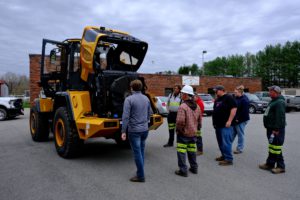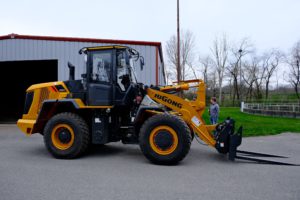
New Loader Key to Wastewater Biosolids Program
With the delivery of a new piece of heavy equipment this week, the Elkins Wastewater Treatment Plant is positioned to continue and potentially expand a program through which sewage-treatment by-products are transformed into fertilizer for area farmers.
The approximately $100,000 purchase of a LiuGong 835H wheel loader was funded from the City of Elkins ARPA award. The new loader includes a Cummins engine and power-shift transmission, safety features such as a rearview camera and 309-degree panoramic view from the operator’s seat, and a fully sealing cab that will provide better protection against fumes generated during wastewater treatment.
The new loader, which replaced one that was four decades old, is crucial to the department’s biosolids program.
Biosolids, a semisolid, nutrient-rich substance also known as “sewage sludge,” are a product of the wastewater treatment process. Once sewage arrives at the plant through the pipes of the wastewater collection system, it passes through a series of steps that separate its liquid and solid components. The liquid components are purified before being released as surface water. The solid components are treated to produce biosolids, which may then be applied to qualifying agricultural land as fertilizer.
“We use belt presses and polymer chemistry to dewater the biosolids,” says Whitney Hymes, the chief wastewater operator for the Elkins Sanitary Board. “The conveyor system deposits the biosolids on the floor, and we use our front-loader to scoop it up and collect it.”
The next step in the process depends on the time of year.
“During the winter, we have to store it on site, but during warmer months we have local farmers who want to spread it on their fields,” says Hymes. “It’s extremely nutrient rich, with lots of nitrogen and phosphorous, so it makes excellent fertilizer. We had one farmer who told us he doubled his hay yield by using our biosolids.”
Land application of wastewater biosolids is highly regulated because the process that generates the biosolids can result in high concentrations of metals and other undesirable contaminants. Only biosolids meeting strict EPA standards may be used this way. The land where it will be applied must be evaluated, and laboratory employees at the wastewater treatment plant must carefully monitor pollutant and pathogen levels to ensure that each batch of biosolids is safe to use this way.
“Before we can apply the biosolids to any agricultural land, we have to take soil samples and make sure that, after application, the total metals and other pollutants in the soil won’t exceed federal limits,” says Hymes. “We come back and check quarterly to make sure everything is still within the required parameters.”
The Elkins Wastewater Treatment Plant biosolids program operates under a Class B license, which limits application to agricultural land only. Hymes is currently evaluating whether the city might shift to a Class A license.
“Under a Class A license,” Hymes explains, “we’d be operating a mill that transforms the biosolids into pellets, which we could sell to anyone who is interested, from farmers to home gardeners.”
Whether the program continues to operate under a Class B license or shifts to a Class A, the new loader will play a vital role for years to come. The Elkins Wastewater Treatment Plant generates 200-250 dry tons of biosolids each year, and the plant’s loader is in operation throughout most of each workday.
“We run our loader 5-6 hours a day, five days a week,” says Hymes. “That was a lot to ask of our old one, which was way overdue for replacement. I’m really pleased that we were able to make this purchase using ARPA funds to minimize the impact on our customers.”
Traffic Safety
Traffic safety is important to every West Virginian. Regardless of whether you are a driver, a passenger, a cyclist, or a pedestrian, laws exists to protect your life and your rights. Most of us area aware of the high profile traffic related […]
Read MoreCity Hall News: Week of Sept. 6, 2021
Elkins, W. Va., September 5, 2021: A busy week at Elkins City Hall will see meetings of council’s Special Hiring Committee, Rules & Ordinances Committee, Finance Committee, and Personnel Committee. City hall is closed Monday for Labor Day, but trash will be […]
Read MoreUpdate Concerning Elkins City Hall COVID-19 Closure
Reopening Date Depends on Pending Test Results Elkins, W. Va., July 10, 2020: Elkins City Hall remains closed today after one city hall employee tested positive for the COVID-19 virus on Wednesday. Reopening could occur as soon as Monday, July 13, but […]
Read More

